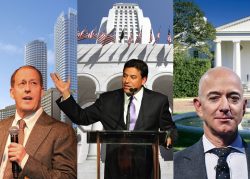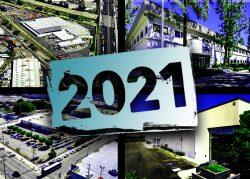Forget all that talk about 2021 as the year of a return to normalcy.
It was not–but L.A.’s real estate market nonetheless managed an abnormally good year overall.
Various bright spots offset a continued lackluster outlook in the office segment, which bore the brunt of the pandemic’s adverse effects, led by the region’s residential market, which notched plenty of records, especially at the top. A key corner of the commercial market soared on deals for studio space, as did the industrial sector, thanks in part to pandemic-fueled logistics demand: Southern California’s industrial market notched nearly $3 billion in sales by August, the most of any market in the country, and kept up the pace through year’s end.
And along with those bigger trends came plenty of only-in-L.A. drama and revealing industry developments, including a splashy broker move and never-ending spec battles.
Here we’ve compiled some of the buzziest.
Broker musical chairs
Brokers are the face of the real estate business, but in L.A. some of them are also a particular kind of celebrity — the beautiful, ambitious, sometimes cutthroat negotiators whose deals and personal lives fill reality shows and spill into tabloid headlines.
And this year some of L.A. ‘s top residential brokers — celebrities and non-celebrities — made splashy career moves. Among them were industry vet Alan Long, who came out of retirement in September to lead a new Avenue 8 team, and Adam Rosenfeld, who took his eight-agent team from Compass to The Agency in July.
But no move generated nearly as much buzz as Bravo star Josh Flagg’s jump from Rodeo Realty to Douglas Elliman in August. The 36-year-old Flagg already boasts a career that’s included more than $2 billion in sales, including deals with A-listers including Adam Levine, Shonda Rhimes and Steve Aoki; he’s also something of a real estate reality show godfather as an original cast member of the hit show “Million Dollar Listing,” which first aired in 2006. So when Flagg abruptly departed Rodeo — a move first reported by The Real Deal — the news sent a certain segment of social media into a frenzy. It also amounted to a coup for an expanding Elliman and a reunion for Flagg, who joined his fellow “MDL” star Frederik Eklund at the new shop.
Crypto bonanza
Of course crypto has found its way into real estate. In recent years, the exploding digital currency created a whole new class of millionaires — and in June The Real Deal chronicled how many of them–including some far-sighted kids who bought their first coins in high school–were increasingly buying up luxe properties across the country.
L.A. industry players took notice.
“We advertise homes as taking crypto,” said the star agent Aaron Kirman, “and from that alone, we’ve had multiple calls from billionaires in the crypto world that we did not have access to before.”
The chronicles of spec land
It’s been quite a year for L.A. spec developers, who as a group represent some of the industry’s brashest, most colorful — and daring — personalities.
In March perhaps the brashest of all, Nile Niami, faced a notice of default from Hankey Capital, which had provided the developer with $83 million in loans for “The One.” Six months later, with no certificate of occupancy in place for “the most expensive house in the urban world,” a judge directed a court receiver to take control of the megamansion. That prompted Niami to respond by filing for bankruptcy in an effort to stave off an auction. Amid the year’s turmoil the developer also threw another property into Chapter 11 and unloaded a flurry of projects, including two Bel Air mansions and his own 6,000 square-foot house in the Hollywood Hills.
Speaking of bankruptcies, 2021 was beyond eventful for Mohamed Hadid, the purveyor of some of the region’s most controversial projects. One of Hadid’s battles, over the fate of 66 hilltop acres adjacent to Franklin Canyon Park, has recently taken more turns than an improbable airport novel.
A precursor to the drama came in January, when Hadid’s main foil — the attorney Ronald Richards, who manages an LLC that bought up the developer’s loans with the stated aim of preserving the land — was moving to foreclose. Hadid threw the entities that own the properties into bankruptcy, and in late November–after months of incessant legal wrangling, a mysterious potential Saudi royal buyer and a failed auction — a judge assigned control of the disputed land to a court receiver — a move that Richards called “a horrible day for Hadid” but which the developer’s team actually welcomed.
Meanwhile, another high-profile Hadid property battle, regarding the half-built mansion Strada Vecchia, saw one major development in September, when a jury determined that the developer and an affiliated entity must pay $3 million in damages; in December, The Real Deal broke the news that the doomed court-controlled property had finally sold, to a little-known Ventura County construction firm which agreed to demolish it.
Yet another spec developer, Ardie Tavangarian, managed to sell one project for $83 million and buy up Elon Musk’s properties while still retaining a relatively low profile.
Read more



Industrial gets sexy
Before the pandemic, e-commerce sales constituted about 10 percent of all retail sales. By the second quarter of 2020, the figure was almost 16 percent — and the “new normal” was just beginning. In 2021, among the biggest beneficiaries of the shift was the industrial real estate market, leading to historic low vacancy rates and record prices.
“Industrial is sexy now,” Jerry Sackler, a longtime L.A.-based industrial broker, said for a Real Deal feature on the trend published in July.
As a result, commercial brokers have had to adapt by taking on increasingly sophisticated responsibilities and straining to find deals. “I have to be a very good detective to find clients,” one agent said. “I have to work to shake that product loose.”
Streamers produce hits — and studio demand
In November, Hackman Capital and its partner Square Mile Capital Management LLC agreed to a landmark deal: a whopping $1.8 billion for the CBS Studio Center in Studio Center. ViacomCBS had been shopping the 38-acre lot for a few months, and the deal it eventually landed outpaced insiders’ predictions by about $500 million. Earlier, in March, Hackman also announced it planned to spend $1.3 billion to renovate the 25-acre CBS Television City campus in the Fairfax District.
The big moves were evidence of a larger pattern: a rising demand for studio space amid the pandemic, especially as high-flying small-screen content producers such as Netflix and Apple TV+ continue churning out hit after hit for a global audience largely stuck at home.
Wall Street also took notice, sending a flurry of institutional-backed cash into the asset class, including a $500 million venture formed in November that was backed by King Street Capital Management and aims to build and acquire up to 750,000 square feet of soundstages.
Charles in charge
You know him as the longtime top deputy to Warren Buffet, but billionaire investor Charlie Munger is also a passionate architect. For years Munger has been donating massive amounts of money to universities for new buildings — on the condition that the institutions use his designs. But this year, a similar agreement at the University of California, Santa Barbara led one architectural adviser to quit in protest, and the resulting brouhaha became the biggest campus architecture controversy in recent memory.
The offending building was a massive, virtually windowless undergraduate student dorm that was inspired by the design of cruise ships, a project the resigning adviser called “unsupportable from my perspective as an architect, a parent, and a human being.” But the 97-year-old Munger stuck to his guns. Amid the controversy, the famously blunt financial legend told The Real Deal that his design would eventually take off across the country.
